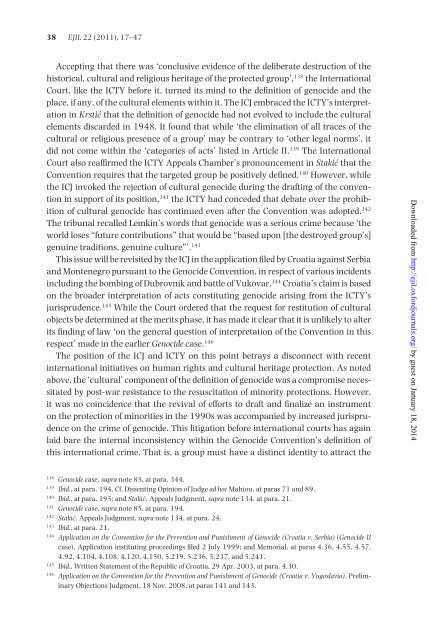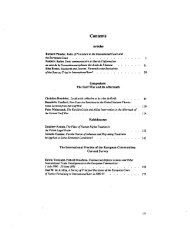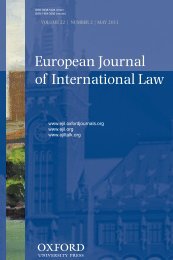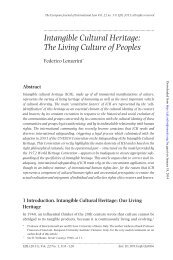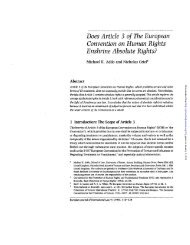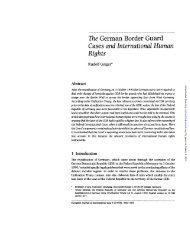Genocide and Restitution - European Journal of International Law
Genocide and Restitution - European Journal of International Law
Genocide and Restitution - European Journal of International Law
You also want an ePaper? Increase the reach of your titles
YUMPU automatically turns print PDFs into web optimized ePapers that Google loves.
38 EJIL 22 (2011), 17–47<br />
Accepting that there was ‘conclusive evidence <strong>of</strong> the deliberate destruction <strong>of</strong> the<br />
historical, cultural <strong>and</strong> religious heritage <strong>of</strong> the protected group’, 138 the <strong>International</strong><br />
Court, like the ICTY before it, turned its mind to the definition <strong>of</strong> genocide <strong>and</strong> the<br />
place, if any, <strong>of</strong> the cultural elements within it. The ICJ embraced the ICTY’s interpretation<br />
in Krstić that the definition <strong>of</strong> genocide had not evolved to include the cultural<br />
elements discarded in 1948. It found that while ‘the elimination <strong>of</strong> all traces <strong>of</strong> the<br />
cultural or religious presence <strong>of</strong> a group’ may be contrary to ‘other legal norms’, it<br />
did not come within the ‘categories <strong>of</strong> acts’ listed in Article II. 139 The <strong>International</strong><br />
Court also reaffirmed the ICTY Appeals Chamber’s pronouncement in Stakić that the<br />
Convention requires that the targeted group be positively defined. 140 However, while<br />
the ICJ invoked the rejection <strong>of</strong> cultural genocide during the drafting <strong>of</strong> the convention<br />
in support <strong>of</strong> its position, 141 the ICTY had conceded that debate over the prohibition<br />
<strong>of</strong> cultural genocide has continued even after the Convention was adopted. 142<br />
The tribunal recalled Lemkin’s words that genocide was a serious crime because ‘the<br />
world loses “future contributions” that would be “based upon [the destroyed group’s]<br />
genuine traditions, genuine culture”’. 143<br />
This issue will be revisited by the ICJ in the application filed by Croatia against Serbia<br />
<strong>and</strong> Montenegro pursuant to the <strong>Genocide</strong> Convention, in respect <strong>of</strong> various incidents<br />
including the bombing <strong>of</strong> Dubrovnik <strong>and</strong> battle <strong>of</strong> Vukovar. 144 Croatia’s claim is based<br />
on the broader interpretation <strong>of</strong> acts constituting genocide arising from the ICTY’s<br />
jurisprudence. 145 While the Court ordered that the request for restitution <strong>of</strong> cultural<br />
objects be determined at the merits phase, it has made it clear that it is unlikely to alter<br />
its finding <strong>of</strong> law ‘on the general question <strong>of</strong> interpretation <strong>of</strong> the Convention in this<br />
respect’ made in the earlier <strong>Genocide</strong> case. 146<br />
The position <strong>of</strong> the ICJ <strong>and</strong> ICTY on this point betrays a disconnect with recent<br />
international initiatives on human rights <strong>and</strong> cultural heritage protection. As noted<br />
above, the ‘cultural’ component <strong>of</strong> the definition <strong>of</strong> genocide was a compromise necessitated<br />
by post-war resistance to the resuscitation <strong>of</strong> minority protections. However,<br />
it was no coincidence that the revival <strong>of</strong> efforts to draft <strong>and</strong> finalize an instrument<br />
on the protection <strong>of</strong> minorities in the 1990s was accompanied by increased jurisprudence<br />
on the crime <strong>of</strong> genocide. This litigation before international courts has again<br />
laid bare the internal inconsistency within the <strong>Genocide</strong> Convention’s definition <strong>of</strong><br />
this international crime. That is, a group must have a distinct identity to attract the<br />
Downloaded from http://ejil.oxfordjournals.org/ by guest on January 18, 2014<br />
138<br />
<strong>Genocide</strong> case, supra note 85, at para. 344.<br />
139<br />
Ibid., at para. 194. Cf. Dissenting Opinion <strong>of</strong> Judge ad hoc Mahiou, at paras 71 <strong>and</strong> 89.<br />
140<br />
Ibid., at para. 195; <strong>and</strong> Stakić, Appeals Judgment, supra note 134, at para. 21.<br />
141<br />
<strong>Genocide</strong> case, supra note 85, at para. 194.<br />
142<br />
Stakić, Appeals Judgment, supra note 134, at para. 24.<br />
143<br />
Ibid., at para. 21.<br />
144<br />
Application on the Convention for the Prevention <strong>and</strong> Punishment <strong>of</strong> <strong>Genocide</strong> (Croatia v. Serbia) (<strong>Genocide</strong> II<br />
case), Application instituting proceedings filed 2 July 1999; <strong>and</strong> Memorial, at paras 4.36, 4.55, 4.57,<br />
4.92, 4.104, 4.108, 4.120, 4.150, 5.219. 5.236, 5.237, <strong>and</strong> 5.241.<br />
145<br />
Ibid., Written Statement <strong>of</strong> the Republic <strong>of</strong> Croatia, 29 Apr. 2003, at para. 4.30.<br />
146<br />
Application on the Convention for the Prevention <strong>and</strong> Punishment <strong>of</strong> <strong>Genocide</strong> (Croatia v. Yugoslavia), Preliminary<br />
Objections Judgment, 18 Nov. 2008, at paras 141 <strong>and</strong> 143.


